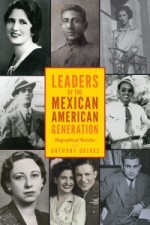“Drawing together an impressive cadre of scholars exploring the interplay between individuals’ personal biographies and the larger currents of U.S. society, the contributors to the anthology Leaders of the Mexican American Generation offer new insight into the multidimensional histories of a range of actors influential on the national stage between 1920 and 1960. Attention to notable individuals, major political currents of the time, and biographical method make the book of value to both a general audience and students of Mexican American history.”
So begin a recently posted review of Leaders of the Mexican American Generation: Biographical Essays in the Western Historical Quarterly. The academic anthology includes thirteen biographical essays. I am proud to have a chapter, “Edward R. Roybal: Latino Political Pioneer and Coalition Builder.”
So what did the book’s editor, Anthony Quiroz, write about my essay in the introduction ?
Kenneth C. Burt’s chapter sheds new light on the political career of Edward R. Roybal of Los Angeles. Burt describes Roybal as being born to a working-class family with deep roots in American soil (four hundred years) and who served in the military during World War II. As with many veterans, he returned to the United States ready to make significant changes in conditions for Mexican Americans.
And while Burt allows that Roybal is perhaps best known for being the first Mexican American elected to a city council since 1881 and for his twenty years of service in the US House of Representatives, another key aspect of his legacy often gets overlooked. Scholars have not duly noted that what kept Roybal successful through those years was his ability to lead through coalition building.
Burt notes how Roybal won election to the Los Angeles City Council in 1949. He put together a progressive coalition of left-leaning groups such as Mexican Americans, African Americans, Jews, other immigrant groups, and organized labor. Roybal cut his political teeth by helping organize the Community Service Organization and the Mexican American Political Association. Later he founded the Congressional Hispanic Caucus and the National Association of Latino Elected and Appointed Officials.
The essay shows the depths of Roybal’s dedication to his people and the ways in which he represented this generation. It also shows that Mexican Americans did not act alone. As in this case, they often sought to work with other similarly oppressed groups. According to Burt, Roybal’s coalition-building skills anticipated the later election of Antonio Villaraigosa as mayor of Los Angeles. As Burt puts it, “the Roybal model of coalition politics has proved too have enduring value in an increasingly multicultural society.”

